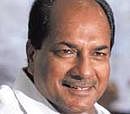Antony, who arrived here last night along with a high- power delegation to hold wide-ranging talks with US Defence Secretary Robert Gates, Secretary of State Hillary Clinton and National Security Adviser Gen (Retd) James Jones among others in the next two days, said he would also call for moving from a buyer-seller relationship to that of transfer of technology and co-production.
"We feel that even though the US is giving arms to Pakistan to fight terrorism, our practical experience is (that) it is always being misused. They are diverting a portion against India. Certainly I will express my concern," he told reporters hours after his arrival here.
Visiting Washington at the invitation of Defence Secretary Robert Gates, Antony is accompanied by Eastern Army Commander Lt Gen Bikram Singh and Andaman and Nicobar tri-services Command Admiral D K Joshi, apart from IAF's Director General (Air/Operations) Air Marshal A K Gogoi.
Defence Secretary Pradeep Kumar and the Defence Minister's adviser Sundaram Krishna are also part of the high-level delegation.
Noting that on the whole Indo-US defence relationship is expanding, Antony said export control restrictions is another "matter of concern" for India.
"We want an early solution to that (export control restrictions)," he said, adding that defence bodies like Defence Research and Development Organisation (DRDO) are still on entities' list.
"Both countries have stake in strengthening this relationship," Antony said, adding that the bilateral defence ties have been steadily strengthening in the recent past.
Responding to a question on recent remarks by the US Defence Secretary that he would be discussing the fighter jet deal with his Indian counterpart, Antony said he was not in a position to tell who would get the multi-billion dollar contract.
"It is a multi-vendor-situation. Trials are over. I can't say who will get it," Antony said.
He also said that in the area of defence procurement, India had a very few procurements from the US in the past, but added that in the last few years it has increased steadily in the high-technology area. "Many are in the pipelines... some through multi-vendor routes, many more would come, but which items I can't say."
"Now, our approach is rather than buyer-seller relations, we want technology transfers, and if possible co-production and joint production," Antony said.
US Defence Secretary Gates had told Pentagon reporters last week that he wants to strengthen and expand America's military-to-military ties with India.
"We are looking to expand this relationship in ways that are mutually beneficial," Gates said. "They (India) have a big competition going on for a new modern fighter. We'll probably have some conversations about that."
The US Defence Secretary said he had a very good visit to India last year, wherein he met Prime Minister Manmohan Singh and his Indian counterpart.
Responding to a question on the India's concerns about restrictions on export of high-technology items, Gates acknowledged that this was high on the agenda and he would like to see those restrictions removed.
"I think that is certainly high on our list, particularly in the context of export-import, or export controls, and my view of the importance of changing those export controls in ways that better protect the things that are really important and open up trade and allow US companies to sell abroad those things that technologies that are not critical," Gates said.
"So, I think India certainly is high on our list in terms of a country that we would like, I would like to see those restrictions eased," said the Defence Secretary at the Pentagon news conference which was jointly addressed by Admiral Mike Mullen, Chairman of the US Joint Chiefs of Staff.The military-to-military relationship with India is exceptionally strong and growing, said Mullen.
"We are very committed to that, and with all of our services. I was recently there and it has taken on a significance that is equal to so many other historic relationships for us, and we know that," Mullen said.
"The Indian Ocean, we also know, is an incredibly important body of water; not just now, but also in the future. So we recognise the importance of keeping that relationship as strong as it is, and also making it grow," he said in response to a question.
